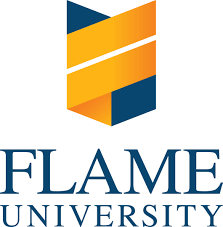Pune, 27th June, 2017: Nearly half of the Indian population defecates in the open, a big sanitation and health problem the government and academics are trying to solve. But how do you encourage more people in urban slums to use shared public facilities instead of engaging in open defecation? And what is the best way to manage shared facilities so that they do not fall into disarray? These are the policy issues that the Bill & Melinda Gates Foundation is funding the Director of the Centre for Experimental Social Sciences (CESS) Nuffield – FLAME University, Dr. Sharon Barnhardt, and her research team to address.
 The CESS Nuffield – FLAME University Research Centre is collaboration between Nuffield College, University of Oxford and FLAME University, the first and only such research center in India. The understanding provides for intensive collaboration between Nuffield College, University of Oxford and FLAME University on the training of young experimental social scientists in India. This unique collaboration, forged in October 2016, gives an opportunity for Oxford scholars to cooperate with the community of social scientists in India. FLAME University students will also be able to attend research training programs at Nuffield College, University of Oxford. University of Oxford is currently ranked first in the world in the Times Higher Education World University Rankings. This collaboration showcases FLAME University’s commitment to focus on quality research, and is an investment in social science research that gives a platform to work across economics, sociology, political science and social psychology in addition to their applications in law, management and public policy.
The CESS Nuffield – FLAME University Research Centre is collaboration between Nuffield College, University of Oxford and FLAME University, the first and only such research center in India. The understanding provides for intensive collaboration between Nuffield College, University of Oxford and FLAME University on the training of young experimental social scientists in India. This unique collaboration, forged in October 2016, gives an opportunity for Oxford scholars to cooperate with the community of social scientists in India. FLAME University students will also be able to attend research training programs at Nuffield College, University of Oxford. University of Oxford is currently ranked first in the world in the Times Higher Education World University Rankings. This collaboration showcases FLAME University’s commitment to focus on quality research, and is an investment in social science research that gives a platform to work across economics, sociology, political science and social psychology in addition to their applications in law, management and public policy.
Dr. Sharon Barnhardt, Director of CESS Nuffield – FLAME University, leads Project Sammaan, an initiative run in partnership with MIT’s Abdul Latif Jameel Poverty Action Lab (J-PAL), the Bhubaneshwar and Cuttack Municipal Corporations, and several other institutions and academics. The Gates Foundation has invested over Rs. 37 crores in the project to reduce open defecation through innovative, community-managed, shared toilet facilities.
Project Sammaan officially inaugurated two community toilet facilities in Cuttack on 17 May 2017 and is building fifty-six more. The inauguration ceremony was attended by members of the communities, Cuttack Municipal Corporation officials and Member of the Legislative Assembly, Debasis Samantray.
Dr. Barnhardt is the lead Principal Investigator for the project, working closely with co-authors Judith Chevalier and Mushfiq Mobarak, both Professors of Economics at the Yale School of Management, Yale University. The research team will identify different ways to encourage toilet usage through community demand generation experiments and household-level pricing and habit-formation experiments.
The facilities where the research will take place have been designed with the end users’ experience in mind and include features like floating roofs that allows for natural light and ventilation, universal access stalls for the disabled and menstrual waste incinerators. Communities are electing Ward Sanitation Committees to oversee the facilities’ Operations and Maintenance. Community Managers will appoint a care-taker who will collect real-time data on toilet usage with a bespoke tablet application during the first year of operations. To combat potential collective action problems, members of Project Sammaan will closely monitor the toilets through official auditing and grievance redressal systems.
Ultimately, project Sammaan aims to create a replicable model and disseminate the project’s research findings through a practical toolkit that can inform urban sanitation policy across India.
About FLAME University:
FLAME University has been created as an academic institution anchored in Liberal Education. Being the pioneer of Liberal Education in India, FLAME University delivers the country’s premier interdisciplinary education experience. It exists to build an aspirational destination for students and faculty, to push the design and nature of studies and to create a societal upgradation phenomenon particularly in the fields of liberal education and leadership.
FLAME University is driven to being one of India’s most respected and reputed centers of learning – the one destination of choice for higher education in the nation for learners and teachers.
Spread on 53 acres of green expanse, FLAME prepares students who have a strong desire to learn and grow continually, welcome new ideas, value diversity with desire to succeed and give their best towards excellence in all spheres of life. Its curriculum includes perspective building, skills and competencies for communication, problem-solving skills, creativity, innovation, teamwork and ethics that also meet the needs of the diverse sectors of the country. It currently consists of four schools: FLAME School of Liberal Education, FLAME School of Business, FLAME School of Communication and FLAME School of Fine & Performing Arts. With >70 quality full time faculty members, the university offers an unparalled education experience. The student – teacher ratio is 10:1, unmatched at the higher education level in India.
FLAME University has been established as a state private university vide the FLAME University Act 2014 (Maharashtra Act No. II of 2015) of the Government of Maharashtra. FLAME University is recognized by the University Grants Commission (UGC) under Section 2(f), and degrees awarded by the University are recognized under Section 22 of the UGC Act, 1956.
